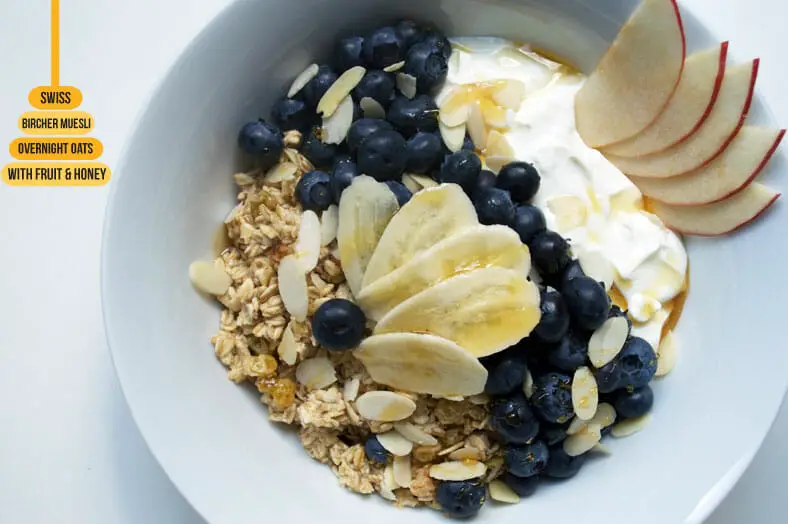Nowadays, it’s fairly common wisdom that most foods are best for you in their all natural, unprocessed and rawest state.
And yet, even as recently as a century ago, this notion was a hotly contested topic. Even the idea of eating vegetables as a health food could (for some) border on heresy.
We’ve come a long way since then, and much of it can be attributed to Dr. Bircher-Benner, the creator of Bircher muesli and a pioneer in modern vegetarianism.

Dr. Bircher-Benner, Muesli and Raw Foodism
Unlike most of the other explorations here on Arousing Appetites, this particular story is zeroed in on the experiences of one singular man. Thankfully, his tale involves no slavery, oppression or systematic ethnic decimation either (we’ve got plenty of those stories if you’re looking for it, though)
And so we go with Dr. Maximilian Bircher-Benner.
Dr. Bircher-Benner
Maximilian Oskar Bircher was born in 1867 in Aarau, Switzerland to a fairly well-off family. While his father was a notary, Bircher demonstrated an early interest in medicine and very quickly enrolled in the University of Zurich to study medicine.
It was in school that he would come into his first major influence for his later philosophies: August Forel. Forel was a famed neuroanatomist in his own right who strongly opposed alcohol and its intoxicative effects on the brain. Bircher took these to heart, and it led to his interest in exploring what other areas of consumption had an effect on the human experience.
After school, Bircher moved to Zurich’s industrial quarter and opened up a general practice. Less than a year into the opening of the practice, however, Bircher came down with a case of weak appetite and jaundice that weakened his immune system. Conventional remedies proved unsuccessful for Bircher at first, so he went an entirely different route with his self-treatment. Drawing upon the advice of ancient Greek philosopher Pythagoras, Bircher stuck to a diet strictly of raw food.
Successfully curing himself of his own affliction (really quickly at that!) really intrigued Bircher about the power of raw foods, and so he immersed himself in the study of the effects of raw food on the body, which would become the guiding principle for the rest of his work.
If you’re interested in raw foods, check out our recipe on Tahitian coconut milk ceviche, or our ceviche coconut salad. Both of these recipes are raw in nature, and will suit a diet in raw foods.
Thermodynamics and Raw Foodism
Before diving into Dr. Bircher’s work itself, it’s perhaps helpful to touch upon the “state of nutrition” in the world at this time.
Quite simply, it was all over the place. Some prevailing theories postulated – like Baron Justus von Liebig with his meat extract syrup – that human energy was derived from meat in the diet. Other theories like those from Sylvester Graham advocated strict vegetarianism, albeit on less scientific and more “quackish” grounds.
What made Dr. Bircher’s experiments and later recommendations so powerful from the rest, however, was his scientific approach to his work in nutrition. His dominant hypothesis of raw foodism, for example, came out of a deep study of the laws of thermodynamics. To Bircher and his teacher Max Rubner, the second law of thermodynamics often called the “law of devaluation of energy” applied directly to food and nutrition as well as other life processes. From this thinking, Bircher postulated that raw foods – or those closest in the value chain to the source energy of the sun – were best for the human body.
Between 1895 and 1900, Bircher-Benner (he married and took his wife’s name in 1899) opened a dietician practice in Zurich to conduct numerous raw foods experiments on his patients, on his own family and on himself.
The experiments could certainly be labeled as dogmatic and “intense” for most. Only raw foods and raw carbohydrates (like what we’ll see with his infamous muesli) were allowed during his ordnungstherapie, and consumption of the likes of alcohol, coffee, chocolate and tobacco were strictly prohibited. Any commercialized or industrialized products like processed milk were disallowed from direct consumption, although they were still allowed for hygienic and external remedial purposes.
On top of diet, Dr. Bircher-Benner advocated a fairly regimented, disciplined and somewhat “monastic” lifestyle for his patients. Bedtime was at 9:00 in the evening, and some sort of physical activity – be it walking, gardening or anything else in nature – was required each day. Bircher-Benner strongly believed that vitality came not just from diet but also from our interplay with the natural world.
Bircher-Benner’s Legacy
The results of his experiments had proved staggering, so by 1900 Dr. Bircher-Benner began publishing and promoting the work he had done.
At first, however, his ideas were not well received. Bircher-Benner was labelled a “quack,” and the ridicule he received for his theories of solar energy-nutrition interplay severely damaged his reputation in the academic community.
Still, Dr. Bircher-Benner powered on, and by 1903 he published his book Kurze Grundziige der Erndhrungs-Therapie auf Grund der Energie-Spannung der Nahrung, or the “Fundamentals of Nutritional Therapy Based on Energetic Tension in Food.”
Despite the backlash from the academic community, there was growing support in the public for his theories and recommendations, and he developed a following of ardent fans referred to as “miislis.” Still to this day, Dr. Bircher-Benner remains one of the key figureheads of the modern vegetarianism and raw foodism movements.
Eventually, much of Dr. Bircher-Benner’s work would be validated especially with the discovery of rich nutrient densities (through chemical analysis) like Vitamin C in fresh fruits and vegetables. In this sense, his more simple observational works were ahead of his time.
Of course, one of the most lasting parts to his legacy is, of course, the Bircher muesli.
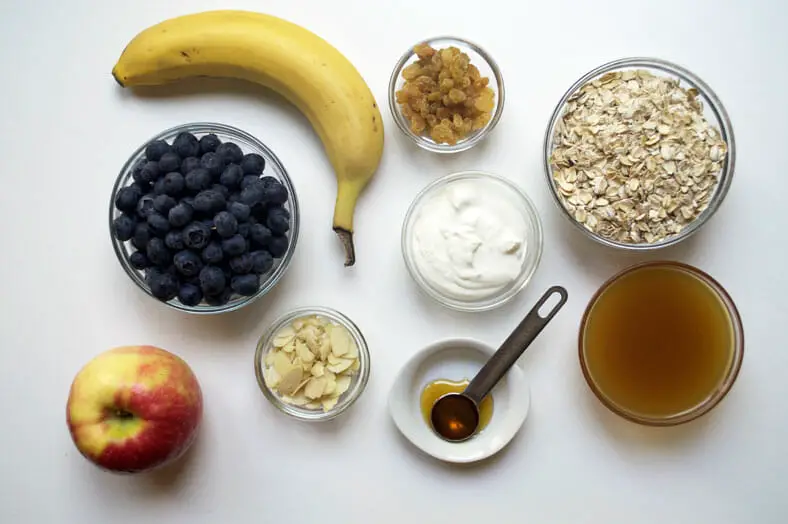
About the Recipe
Really, this muesli recipe is as easy as it gets, and it really does provide an amazing, delicious and nutritious start to your day.
The key to making a true Bircher muesli comes with soaking your oats for a prolonged period of time. According to Dr. Bircher-Benner, this soaking gives the oats a chewier consistency and improves the digestion and absorption of all the nutrients prevalent in the muesli.
You’ll start your muesli by taking a bowl of oats and raisins and adding apple juice in with it. Mix around the apple juice and ensure that the oats are sufficiently wetted (if not submerged altogether), then place the bowl in the fridge for at least an hour. Ideally, you could soak the oats overnight to make them even chewier, but an hour is the bare minimum you should do.
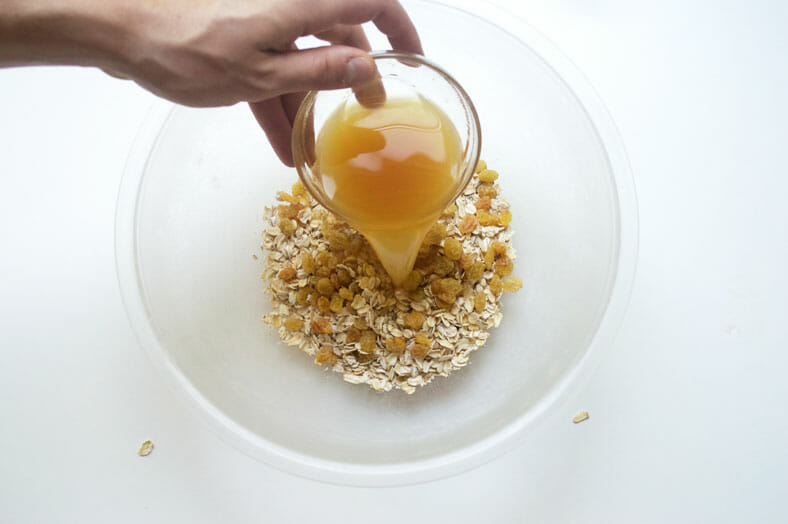
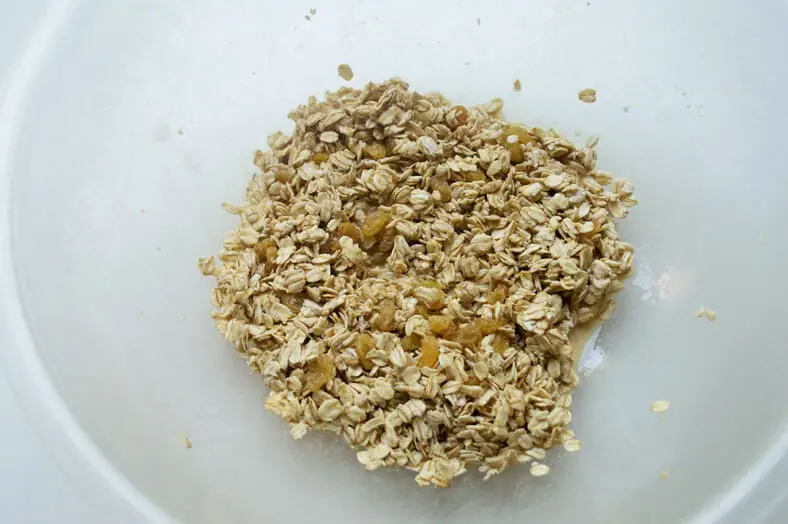
What will happen is that the oats will soften and absorb the juices, and each singular oat will enlarge slightly and become softer. This becomes the base of your muesli onto which you’ll put any sorts of toppings you like.
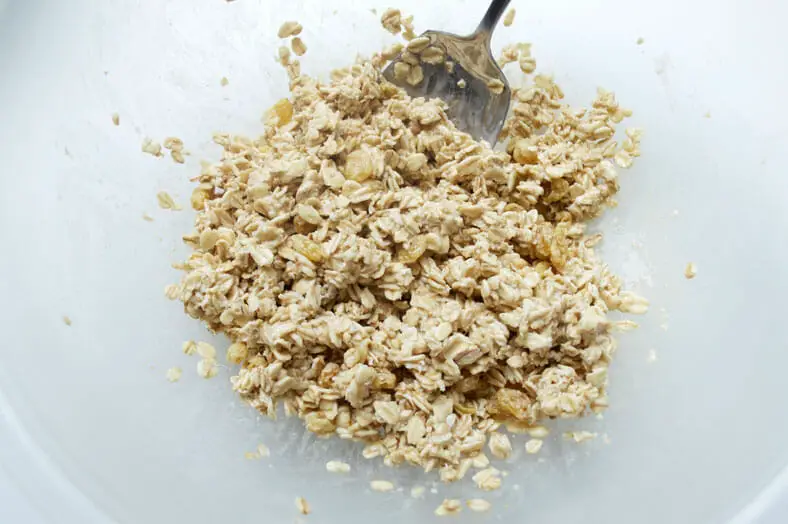
To serve, take your oats out of the fridge and divide among the various breakfast plates your preparing. The beauty about muesli is that the toppings are entirely up to the eater, so anything from fresh bananas to fresh blueberries to slivered almonds to yogurt is totally fine.
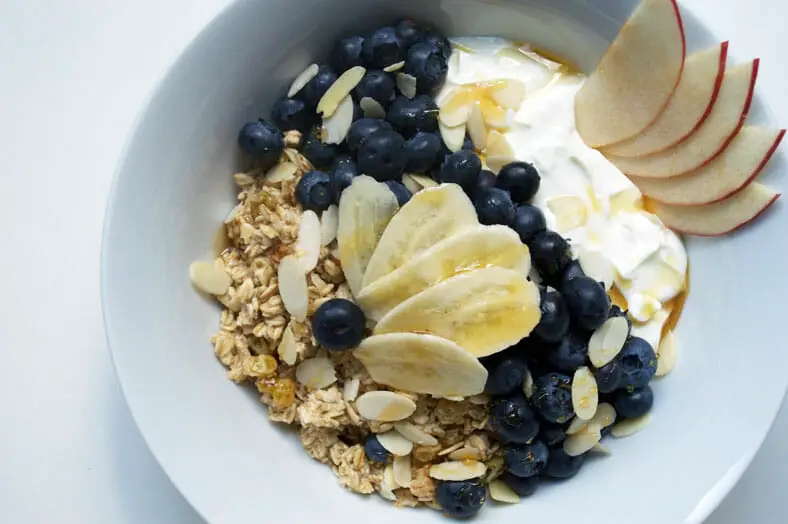
The only thing to remember with your accompaniments is Dr. Bircher-Benner’s cardinal rule: avoid overly cooked, baked, preserved, bleached or refined foods. Keep your muesli simple, natural and (if you can help it) raw.
And that’s it… Bircher muesli is really that easy!
Our Take on the Recipe
In a slightly ironic manner, it’s the simpler recipes like this muesli that ends us having to be more choosy with the recipes we use as sources. Still, some are better than others, and we found this particular recipe from La Tartine Gourmande to be the most elegant and hence to be our reference recipe.
More than anything else, we sought to make our muesli recipe simpler than what was in our reference. We kept the mixture of oats and apple juice the same, although we did swap out cranberries in favor of golden raisins thanks to a tip from another recipe we liked.
To appeal more to Dr. Bircher-Benner’s underlying principles of raw and natural, we cut out toppings like the blueberry sauce and anything involving adding of extra sugars. While the muesli comes out sweet already and is supported by the sweetness of fruits added to it, we did make a suggestion of adding a drizzle of honey for those looking for a sweeter (and non-vegan) version of the breakfast.
Other than that, there’s very little else that we needed to be done to the recipe. Bircher muesli is extremely easy to make, and it makes for one delightfully simple and nutritious breakfast to give you a great start to the day.
If you love this recipe and fruits and treats for breakfast, you’ll love our made from scratch Belgian waffles recipe (gaufres liegeoises) – don’t let the name scare you, it’s using common ingredients you probably already have in your kitchen.
Enjoy!
What would you add as toppings into your Bircher muesli? Comment below!
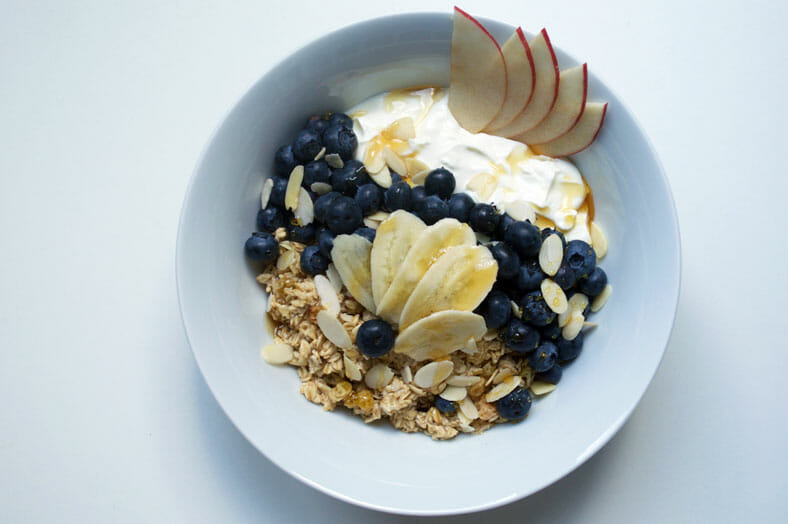


Bircher Muesli: Swiss Oats and Fruits
- Total Time: 2 hours
- Yield: 2 people 1x
Description
Bircher Muesli: Swiss Oats and Fruits with banana and yogurt.
Ingredients
Muesli
- 1 cup steel cut oats
- 3/4 cup apple juice
- 1/4 cup golden raisins
Accompaniments (Choose What You Like)
- 1 apple, cored and sliced
- 1 cup fresh blueberries
- 1/2 cup slivered almonds
- 1 banana, peeled and sliced
- 1/2 cup Greek yogurt
- 1 teaspoon honey
Instructions
Stage 1 – Pre-Soak Oats
- In a mixing bowl, combine your oats with your raisins and mix around while still dry
- Next, pour in your apple juice and mix lightly together
- Place your mixing bowl into the fridge, and let the oats and raisins soak for at least 1 hour together with the apple juice. The longer the soaking, the better the muesli you’ll have, but 1 hour is a good minimum amount to get the job done
Stage 2 – Compile your Bowl of Muesli
- After at least an hour, take your mixing bowl of muesli out of the fridge and partition evenly among serving bowls
- From there, add any sort of toppings and accompaniments you’d like. The beauty of bircher muesli is that it is incredibly versatile and customizable to your taste. Enjoy!
- Prep Time: 1 hour
- Cook Time: 1 hour
- Category: Breakfast
- Cuisine: Swiss
